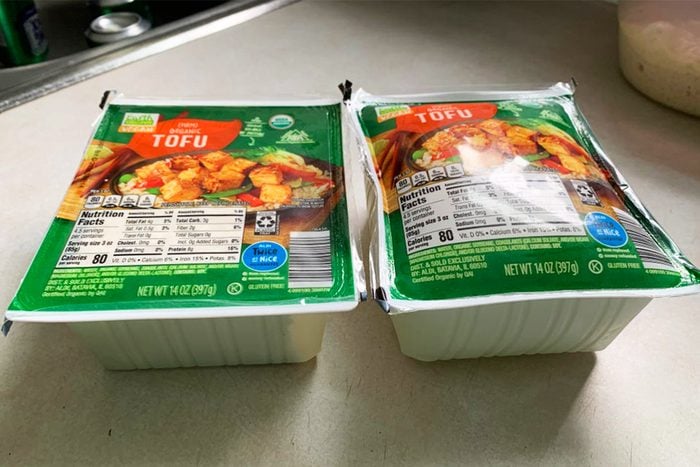If You See Bloated Food Packaging, This Is What It Means
Updated: Mar. 23, 2023

You'll want to steer clear of products with bloating packaging at the store. It's a food safety issue—here's why.
Some items are meant to be puffy, like homemade marshmallows. Or pillows. But packaged food isn’t usually one of those items. Still, there may be times when you’re at the store and spot bloated food packaging. You should pay attention to this oddity—and for good reason.
The Basics of Bloated Food Packaging
There’s already some air in many of our groceries. Different types of food packaging use a different amount of air depending on the food, says Wei Zhang, professor of food science and food safety specialist at the Illinois Institute of Technology.
Perishable foods like cheese and sausage are often packaged with little or no air to prevent microorganism growth. Some foods, like potato chips, are packaged in a pouch with extra air to preserve the texture and prevent damage. That’s normal. But if an item has swelled beyond its expected size, turning into bloated food packaging, you’ll likely notice it.
See what the colored circles on food packages stand for.
Does Bloated Food Packaging Mean the Food Is Dangerous?
Bloated food packaging doesn’t always mean the food inside is dangerous to eat, says Zhang. If you live in a high-altitude area, such as Denver, a food package may swell because the air pressure inside the package is higher than the environmental air pressure outside. In that case, the food hasn’t gone bad.
But most bloated food packaging is caused when microorganisms found in perishable foods produce gas, such as carbon dioxide. Some of these microorganisms cause food to spoil, and others can even cause food poisoning.
Which Foods Are Most Often Affected?
Bloat can happen to all kinds of foods, Zhang says. However, dried and low moisture foods, such as raisins or peanut butter, are much less likely to suffer this fate. This is because the moisture content in these foods are way below what microorganisms need to grow.
What Should You Do to Stay Safe?
Zhang suggests some common sense practices. Don’t purchase any products with bloated packaging. Store your food properly at intended conditions. Avoid exposure to extreme heat or sunlight, which can damage food packaging. Always look at the expiration date of the food before eating it. Most of all, use your own good judgment.
“If the food is days or even weeks beyond the printed expiration date and the package is bloated in a way that is not supposed to be in its normal and original packaging, it is always a good idea to just discard such food for safety reasons,” Zhang says.
